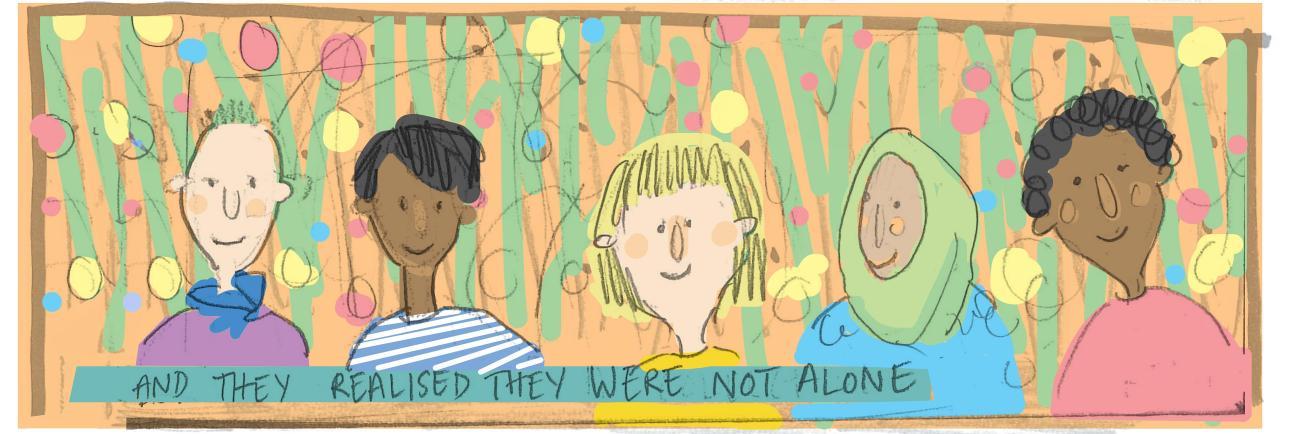Introduction
Peer support is not new and exists in many forms – from informal sharing of experiences, to formalised peer support roles in services (paid and unpaid). It covers one-to-one as well as group relationships and activities.
But if someone asked you what peer support is, this might take you back to your school or student days and the friendships that helped you navigate the trials and tribulations of exams, first or unrequited love, broken hearts or falling outs. Or it might make you think about online support forums like MumsNet, or the peer support that is a well-known element of Alcoholics Anonymous?
Peer support in my experience can also be an important ‘by-product’ of a group of peers coming together to campaign on a common cause. The Care Home Relatives Scotland Facebook group brought together people unable to, or severely restricted in, visiting their loved ones in care homes during lockdown. It was a private space to benchmark their experiences, pool practical advice on navigating guidelines and regulations as well as campaigning for Anne’s Law. This hoped for legislation recognises meaningful contact as a fundamental right and essential to supporting health and wellbeing; and argues that care home residents rights should be no lesser than others in the community. But their Facebook group has also been a space to share loss and grief, including those bereaved, provide empathy and support to one another as well as the opportunity to work on the campaign.
But what do they all have in common?
- They involve peers in relationship with one another. Arguably, peer support isn’t peer support if it’s led by a professional expert.
- They have the same or similar lived experience and feel kinship and connection with one another.
- It’s for those who want it and choose to engage in it; mutuality is in-built.
Co-designing peer support with care survivors
Iriss has been working with two third sector organisations, Future Pathways and the Scottish Recovery Network to co-design peer support with care survivors, for care survivors.
Future Pathways is an organisation that supports people abused or neglected as children in the Scottish care system, funded by the Scottish Government. Since 2016, 2,344 people have registered with them, 86% still living in Scotland and a further 10% resident elsewhere in the UK. Their average age is 48 years, although trends show increasing numbers under 40 years old seeking their support. Most care survivors now self-refer, a change from previous years where they more likely to hear about Future Pathways from the Scottish Child Abuse Inquiry or other services working with people who had experienced childhood abuse. Future Pathways has learned over the years that one size doesn’t fit all so they buy and co-ordinate a mix of services tailored for each individual to help them live well, improve their own lives and achieve personal goals. Following a review of their services, care survivors told them peer support was a missing element and a gap they wanted to plug. Hence our project together!
And, of course, the Scottish Recovery Network are huge advocates of peer support, working with communities, services and organisations to make mental health recovery real, powered by lived experience. They have developed a range of training and resources called Peer2Peer you might want to look into. Back in 2016, their Director, Louise Christie, also wrote this Iriss Insight for us on peer support roles in mental health services.
Intentional peer support?
The Scottish Recovery Network have also introduced us to ‘intentional peer support’. But what’s that? And what does that mean for peers or any organisation thinking of setting up peer support? Intentional peer support grew out of the activism of the user/survivor/ex-patient/mad movement to promote a more relational approach and to bring about social change. IPS, founded by Shery Mead offers a range of training and resources.
In our work with Future Pathways and the Scottish Recovery Network we explored how to use your lived experience with intent so it supports recovery (doing it well and minimising harm). We looked at the CHIME model, that focuses on how to build Connection, Hope, Identity, Meaning and Empowerment. Peer support is all about our emotions and how we feel/make others feel, as well as the behaviours and mindset that supports this while doing the activities we want to do together!
‘Intentional peer support’ also means that anyone engaged in it would knowingly choose it. People with lived experience might have been recruited to be a peer support worker and had induction or training to this end, or have been recruited as a volunteer. Our discussions also highlighted that there can be danger in oversharing (it can be triggering if we go into too much detail) and people shouldn’t be regarded as ‘broken’ with some expressing the keen desire not to be seen as a victim. Peer support is not there to ‘fix people’ and neither are people ‘superhuman.’ We also know that peer support can transcend service boundaries, if and when relationships turn into friendship.
So how does recovery play into peer support?
Discussions highlighted that we need to be recovered or ‘well enough’ to be able to offer others peer support – depending on whether we see recovery as a final destination, or a continuous journey and something that is lifelong. We also considered that we can experience set-backs in our recovery, and may need to step back from a peer support role during these times.
Peer support and a future vision for health and social care
We don’t ever want peer support to be seen as an excuse to remove the services that people need.
But peer support can be a key missing gap in people’s recovery, providing meaningful connection and community, fun, friendship and purpose with others who understand us so we aren’t on our own. It recognises interdependency as a core component of what it is to be human, our need to be seen, heard, give back and have agency in our life, and for some, agency in working towards a better future for others. For those with lived experience in our co-design group, the next generation of care survivors were often in their thoughts, hence their desire to educate and ‘influence up and out’ to help end abuse.
This aligns to the voices in the Independent Review of Adult Social Care who said:
- Hear my voice
- Honour my rights
- Ease my way
- See me as part of the solution, not the problem
- Let’s create a different and better narrative
And in terms of imagining the future, will this be one where we see more people with lived experience recruited to peer support posts and employed in the sector? And will we have had that debate on whether volunteers should be paid or not, and if so, how we do it so it doesn’t negatively impact on anyone’s benefits? And will there be more organisations joining Future Pathways in investing in peer support as something that can play an important part in someone's recovery, or secure funding and recognition of the valuable work peer-led organisations do?
To end
So, to come full circle… What is peer support? I think it’s the positive, protective and empowering relationships that we want, need and choose to have with people a bit like us; the agency we take for ourselves and what we give back.
For me, this relates to Iriss’s work on day-to-day dignity because it recognises and respects what it is to be human and mortal: our strengths and frailties, our hopes and fears, our empathy and compassion and ultimately, our interdependency in life.


